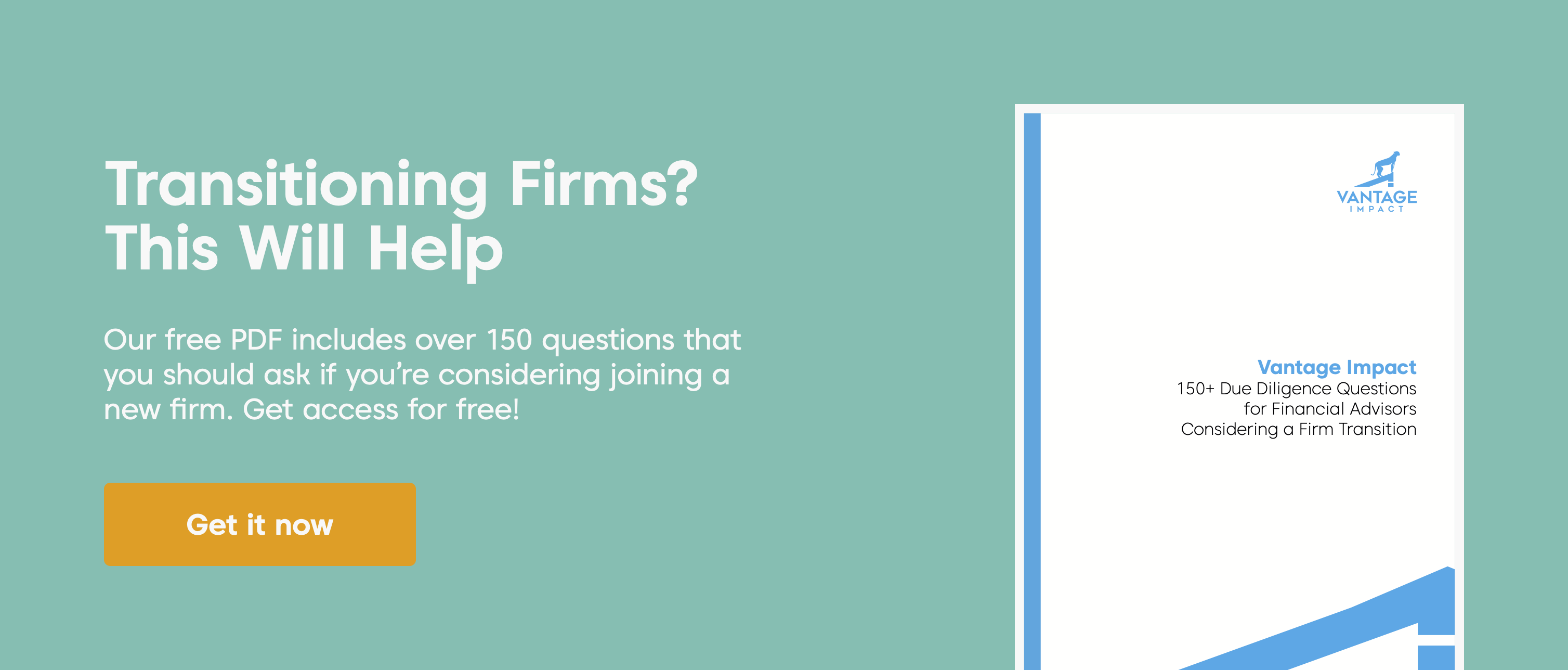Financial advisors want to position themselves as best as possible to serve their clients and be compensated fairly. Unfortunately, they might find themselves with a broker-dealer that holds them back from fully realizing success.
Most of the time, the issues will involve their current firm creating gaps in their business model, but some may be worse or more personal. We take a look at nine common reasons why financial advisors switch firms.
1. Scandals With Your Current Firm
Public opinion toward big banks has been gradually declining for the last decade. Still, some firms keep making decisions that hurt their image and financial advisors by association.
Wells Fargo was in the news again recently after customers in fourteen different states had their mortgages in forbearance without their consent. Through misleading copy on their website, users would click a link seeking COVID-19 information, but would immediately be placed in forbearance.
Issues come up all the time, but if the broker-dealers continuously support practices that could hurt the customers, it may be time to begin the transition process and partner with a new firm.
2. Limitations with Investment Products
Investment firms build their suite of financial products, but they also limit the products available to the financial planners. They force advisors to sell certain financial services and products, restricting the range of opportunity advisors can make available to their clients.
This leaves clients wanting more than their current advisor can fulfill, and it might even make them want to switch to a new advisor with access to more attractive products.
3. Slow to Adopt New Technology
The world is only going to become more digital, and consumers are used to having information at their fingertips. But some broker dealers are still living in the dark ages, and have been incredibly slow to adapt to new technology. Some firms are still heavily reliant on paper and printed documents, rather than providing electronic signature and document storage. Giving customers access to information when and how they want is now the rule.
Advisors will have an inferior experience when their firm isn’t investing in emerging technology innovations. If processes are slow and mistakes are being made, it's probably a lack of suitable technology, integration, reliability, or accessibility.
The firms that will win are the firms that embody the idea that advisors can succeed anywhere- and enable them to work on the go, instead of restricting access to an office. With digital storage and technology support through integrated CRMs, advisors with a strong technology backbone can be more effective and efficient in both client and prospect follow-up.
One other consideration with technology is consistent client communication. Advisors want to be able to treat each client uniquely and freely. However, issues start to arise when they don’t have the tools to connect with their clients regularly. This applies to current customers and future clients as well.
By investing in a quality software for digital marketing and/or client communications, advisors can have access to channels that create positive relationships. Being able to generate quality leads and maintain responsive relationships is paramount for the advisors to run a successful business.
4. Changes in Compensation
Compensation plans are reviewed annually, but sometimes firms make arbitrary decisions to put illogical standards on advisors as part of their compensation. Some firms require that their advisors sell a particular set of products and meet individual revenue requirements.
However, the advisor might find some of these products useless or without benefit for their customers, so they are stuck between taking advantage of customers or sacrificing their income. Advisors should be able to have more freedom and control within their compensation plans. Recently, firms have started putting more emphasis on growth rates for production, while eliminating rewards and bonuses for larger producers who may not be growing their $1M+ practice at rates desired by their current firm. This leaves the most successful advisors feeling ignored during times when firms should be recognizing them more.
5. Inferior Marketing Support
A lot of firms offer some version of a group marketing plan, but those marketing plans often have more negative effects than positive ones. The canned blogs sold to multiple advisors can create duplicate content issues. If Google’s review of your website finds that this duplicate content is a result of what Google refers to as “deceptive practices,” they will remove your website page from search results.
When the advisor wants to create original marketing content, there is usually a painstakingly long, complicated process attached to it. Approvals might not come for weeks, which doesn’t work well when advisors are trying to respond to developments in the media as part of their marketing plan.
6. Lack of Support in Compliance Issues
We hope this isn’t going to become the case for advisors, but unfortunately, some have had to deal with their firm not supporting them over compliance issues. Suppose advisors find themselves in a lawsuit situation over practices that were recommended or controlled by their partnered firm. In that case, they may be surprised to see a lack of support in litigation.
7. Poor Cybersecurity Practices
As the world continues to turn digital, cybersecurity needs to continue to evolve and transform as well. The best broker dealers are investing millions of dollars in protecting their advisors, and their advisors’ book of business. Many have guarantees, where if an account seems to be tampered with, they will automatically make it right for the customer, while they conduct an investigation. Remaining with a firm that lacks the proper online protections won’t be a noticeable issue until fraud takes place, and at that point it will be too late. Having the right cybersecurity measures doesn’t seem like it’s very important, but neither does insurance until you need it...
8. Unable to Team With Other Advisors
Part of running a business means growing and scaling operations. However, it becomes difficult for a single advisor to meet growing demands alone. Teaming up with other advisors is an excellent way to expand the advisory’s practice and capacity.
Some firms won’t allow that, though. They lock advisors into contracts that keep the operations under one person’s responsibility. So when the advisor is looking to build out their business from an individual practice into a larger organization, they are unable to do so. By transitioning to a new firm, the advisor will be able to grow their team, capacity, and revenue.
Plus, when it’s time to retire, the advisory runs the risk of losing clients as it gets passed on. However, with teams, clients are much less likely to leave knowing that the value they’ve received has come from a group of people, so the value of the company doesn’t turn on one person’s contributions.
9. Colleague Successfully Transitioned
We’ve all heard the stories of advisors who wanted to make the switch but dealt with the fear and anxiety of transitioning. But they took the leap of faith, and it paid off. Clients followed, technology was upgraded, communication improved, and the business grew.
Any advisor can make the change. They could realize more success if partnered with the right firm, and Vantage Impact is here to help them transition. The waters may be muddy and confusing, but Vantage Impact will put someone on their side to look out for them by introducing them to the right partners to help them grow their business the way they want to grow.
Request a consultation today if you’re interested in making the switch and growing your business.




